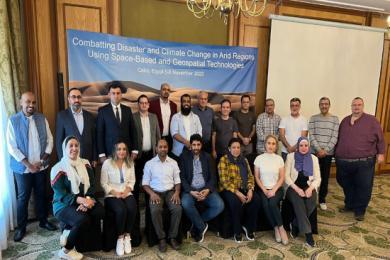
UN-SPIDER workshop on combating droughts
The United Nations Platform for Space-based Information for Disaster Management and Emergency Response (UN-SPIDER) of the UN Office for outer affairs (UNOOSA) co-organized a workshop on combating disaster and climate change in arid regions using space-based and geospatial solutions. The workshop, which took place in the Egyptian capital Cairo, was a cooperation with the Egyptian Society for Environmental Change, Matrouh University and Delta State University.
According to UN-SPIDER, the participants were provided with training in the capture, processing, analysis, and use of space-based data for use in combating the effects of climate-change driven disasters in arid regions. Special emphasis was placed upon spatial-temporal analysis methods which aid in the processing of freely available satellite data products and services to understand and mitigate against the effects of climate-induced disasters.
The event’s focus lay on combating droughts. Droughts are a recalcitrant problem in arid regions and are characterized by deep, widespread, and underestimated impacts on societies, ecosystems, and economies. Drought is among the most persistent and severe disaster hazards faced because they are difficult to forecast, not well understood and their cost to society and ecosystems substantially underestimated. The participants aim was to help data-driven solutions to implement the Sendai Framework for Disaster Risk Reduction, the Paris Agreement and the Sustainable Development Goals of the Agenda 2030.
Read UN-SPIDER’s whole summary here or the description of the workshop here.